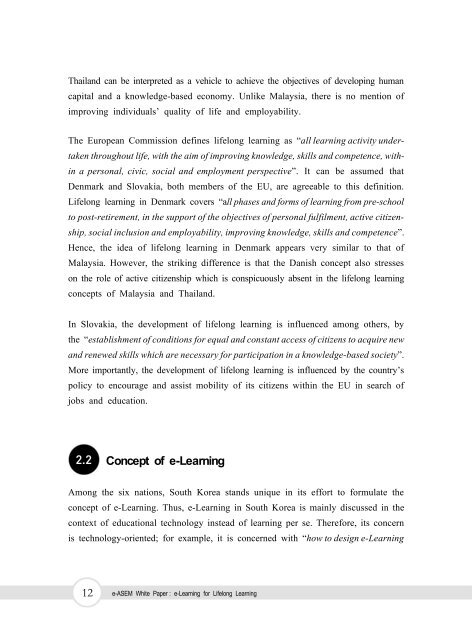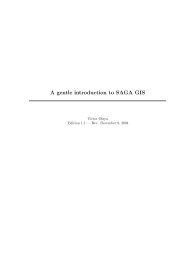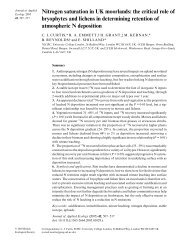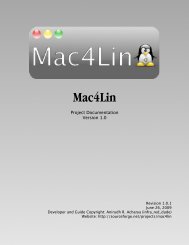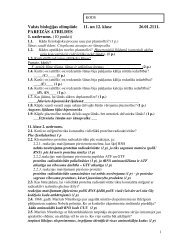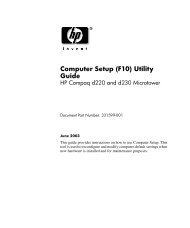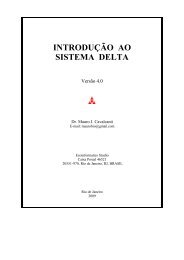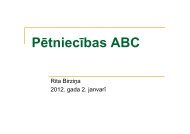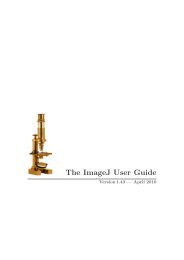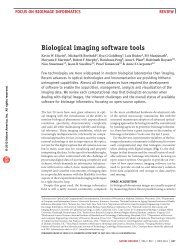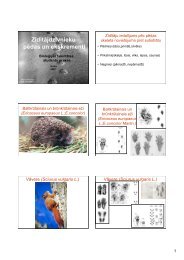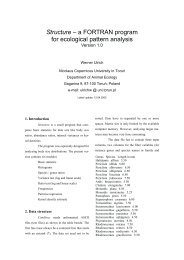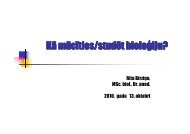- Page 2 and 3: e-ASEM White Paper: e-Learning for
- Page 4 and 5: hanced this large volume and made i
- Page 6 and 7: 02❚Japan❘Tsuneo Yamada ∙ 105
- Page 8 and 9: Part I A Cross Analysis of e-Learni
- Page 10 and 11: Introduction This cross analysis re
- Page 12 and 13: tion system discussed above. Depend
- Page 14 and 15: secondary school leavers to further
- Page 18 and 19: contents effectively or virtual lea
- Page 20 and 21: the other hand, the policies of Den
- Page 22 and 23: certification system for adult educ
- Page 24 and 25: Collectively, the country reports i
- Page 26 and 27: students represent an area identifi
- Page 28 and 29: ships are with Microsoft (Partners
- Page 30 and 31: to overcome that are openly acknowl
- Page 32 and 33: Part II White Papers of Six Asia-Eu
- Page 34 and 35: Lars Birch Andreasen Lars Birch And
- Page 36 and 37: Chapter 1 The Danish educational sy
- Page 38 and 39: Youth education The youth education
- Page 40 and 41: 2010). Short-cycle higher education
- Page 42 and 43: Vocationally oriented education and
- Page 44 and 45: A comparison of the two parallel Da
- Page 46 and 47: education at folk high schools, pri
- Page 48 and 49: education consists of forms of teac
- Page 50 and 51: The traditions of thought behind th
- Page 52 and 53: ● Employability / adaptability Li
- Page 54 and 55: Chapter 3 Government policy, fundin
- Page 56 and 57: in both public and private enterpri
- Page 58 and 59: They shall support good job opportu
- Page 60 and 61: The aim of the strategy is to incre
- Page 62 and 63: that had clear common pedagogical g
- Page 64 and 65: Readiness Index, Denmark was ranked
- Page 66 and 67:
Table 4-2 shows that the European U
- Page 68 and 69:
4.1 The basic school education and
- Page 70 and 71:
The expert group recommended that:
- Page 72 and 73:
The latest governmental initiative
- Page 74 and 75:
● The definition of assignments i
- Page 76 and 77:
ICT skills, students appear to act
- Page 78 and 79:
education or e-Learning possibiliti
- Page 80 and 81:
From the beginning of the e-Learnin
- Page 82 and 83:
learning situations and the two lea
- Page 84 and 85:
courses that qualify people in the
- Page 86 and 87:
educational materials are uploaded
- Page 88 and 89:
5.1 The Master’s Programme in ICT
- Page 90 and 91:
to the virtual conditions of the st
- Page 92 and 93:
modules the students work in groups
- Page 94 and 95:
― was established. 36 museums and
- Page 96 and 97:
Fig. 5-b The website of the Annex T
- Page 98 and 99:
In 2005-07 a project was launched o
- Page 100 and 101:
as an independent homepage at www.u
- Page 102 and 103:
as in the delivery processes (cf. p
- Page 104 and 105:
References Aceto S, Koskinen T, Wer
- Page 106 and 107:
Fibiger B et al (2004) Master in IC
- Page 108 and 109:
e-Learning for Lifelong Learning in
- Page 110 and 111:
Executive Summary 1) In Japan, “l
- Page 112 and 113:
Chapter 1 Educational Systems in Ja
- Page 114 and 115:
education and upper secondary gener
- Page 116 and 117:
専門士 8) Specialized Training
- Page 118 and 119:
1.2 Japanese Education Characterist
- Page 120 and 121:
The percentage of students who go o
- Page 122 and 123:
Figure 1-7 The transition of the nu
- Page 124 and 125:
Figure 1-10 The transition of educa
- Page 126 and 127:
The chart (Chart B4.1, In OECD, “
- Page 128 and 129:
(2) The Lifelong Learning Policy Bu
- Page 130 and 131:
ICT in the classroom was 58.5%; tha
- Page 132 and 133:
4) Lifelong Learning Indicators (1)
- Page 134 and 135:
1.3 Figure 1-19 Comparison of lifet
- Page 136 and 137:
Chapter 2 Lifelong Learning and e-L
- Page 138 and 139:
War II. For example, there was scho
- Page 140 and 141:
sense, it is asynchronous and onlin
- Page 142 and 143:
universities, promoting the Open Un
- Page 144 and 145:
it is necessary to fulfill the educ
- Page 146 and 147:
3.3 The of lifelong learning and th
- Page 148 and 149:
i) Support for learning throughout
- Page 150 and 151:
that promote lifelong learning. Fur
- Page 152 and 153:
are capable of meeting the ever sop
- Page 154 and 155:
White Paper on Education, Culture,
- Page 156 and 157:
Fig. 3-5 Numbers of Museums (from T
- Page 158 and 159:
ects that correspond with the senio
- Page 160 and 161:
Science, Cultural and Information S
- Page 162 and 163:
practical vocational training and s
- Page 164 and 165:
Table 3-1 The main systems for the
- Page 166 and 167:
transition phase to two-way learnin
- Page 168 and 169:
The lifelong learning platform mean
- Page 170 and 171:
the technology field of ‘Technolo
- Page 172 and 173:
hou/1286417.htm). Fig. 4-1 Teachers
- Page 174 and 175:
The goal of the Contest on Good Pra
- Page 176 and 177:
onment plans and teacher support is
- Page 178 and 179:
high school students exchanged idea
- Page 180 and 181:
OUJ research and support division.
- Page 182 and 183:
to radio programs to graduate is in
- Page 184 and 185:
tate communication between teachers
- Page 186 and 187:
1) Introduction OCW is a free and a
- Page 188 and 189:
For such a case a university must b
- Page 190 and 191:
can be matched with user needs. Act
- Page 192 and 193:
nomical measure for evaluation. Cur
- Page 194 and 195:
5.3 NPO CCC-TIES consortium: A coll
- Page 196 and 197:
TIES has all the basic e-Learning f
- Page 198 and 199:
Figure 5-3-5 A cell phone used with
- Page 200 and 201:
Figure 5-3-7 TIES Live to a cell ph
- Page 202 and 203:
A digital pen with a built-in camer
- Page 204 and 205:
ination, and application of knowled
- Page 206 and 207:
2) Framework of quality assurance i
- Page 208 and 209:
Private Enterprises (recruiting div
- Page 210 and 211:
Table 5-4-1 Numbers of Skill Items
- Page 212 and 213:
Entry Level Intermediate Level Adva
- Page 214 and 215:
that aim at realize these; ● Sinc
- Page 216 and 217:
living standard. In this way, we be
- Page 218 and 219:
Registration Everyone who wants to
- Page 220 and 221:
Approximately five questions are in
- Page 222 and 223:
● WLP is a successful project in
- Page 224 and 225:
OUJ manages a common metadata datab
- Page 226 and 227:
egisters the original metadata, it
- Page 228 and 229:
in EU, a GLOBE partner, by harvesti
- Page 230 and 231:
i) Metadata GLOBE members adopt IEE
- Page 232 and 233:
Chapter 6 Recommendations and Prosp
- Page 234 and 235:
ecognition of the concept of lifelo
- Page 236 and 237:
e-Learning For Lifelong Learning in
- Page 238 and 239:
Executive Summary Lifelong learning
- Page 240 and 241:
Chapter 1 The Malaysian Education S
- Page 242 and 243:
ing age group of 15 to 64 years (re
- Page 244 and 245:
the entire Malaysian education syst
- Page 246 and 247:
1-3 Lifelong Learning and e-Learnin
- Page 248 and 249:
1.4 Post-secondary Education Post-s
- Page 250 and 251:
(2) Community Colleges Malaysian co
- Page 252 and 253:
MYS MECD MAAI National Youth Traini
- Page 254 and 255:
universities, i.e. Multimedia Unive
- Page 256 and 257:
The Plan also notes that lifelong l
- Page 258 and 259:
in Malaysia to implement RPL polici
- Page 260 and 261:
life, takes place at all ages and a
- Page 262 and 263:
1) e-Learning in Schools e-Learning
- Page 264 and 265:
introduced their own LMS, even if t
- Page 266 and 267:
concern for the creation of a knowl
- Page 268 and 269:
esponsible for overseeing the prepa
- Page 270 and 271:
The following is the diagram of the
- Page 272 and 273:
(3) NHEF The PTPTN is a semi-autono
- Page 274 and 275:
Schools, upgrading of ICT infrastru
- Page 276 and 277:
eferences for the conferment of awa
- Page 278 and 279:
Chapter 4 Status and Characteristic
- Page 280 and 281:
◦ Providing better management, gu
- Page 282 and 283:
W O U iRadio is OUM’s internet ra
- Page 284 and 285:
courseware, online or e-Learning te
- Page 286 and 287:
The USM, is a prime example of a tr
- Page 288 and 289:
appropriate field of study at the u
- Page 290 and 291:
(Government of Malaysia, 2008) conf
- Page 292 and 293:
post offices around the country; ta
- Page 294 and 295:
Government-linked agencies, private
- Page 296 and 297:
delivering short courses and traini
- Page 298 and 299:
Malaysia is: “Learning engaged by
- Page 300 and 301:
as gross enrolment ratios and publi
- Page 302 and 303:
References Ahmad Rafee Che Kassim,
- Page 304 and 305:
Does Prior Learning Really Matter?
- Page 306 and 307:
Study Malaysia Online (n.d.) Offici
- Page 308 and 309:
Chapter 6: Table Ⅰ:Four Strategie
- Page 310 and 311:
QA : Quality assurance RPL : Recogn
- Page 312 and 313:
Alena Pistovčákova Alena Pistovč
- Page 314 and 315:
Chapter 1 Educational systems in th
- Page 316 and 317:
The system includes the following c
- Page 318 and 319:
is the completion of the system of
- Page 320 and 321:
learning and study programs; 3. Mut
- Page 322 and 323:
ing the approximation of education
- Page 324 and 325:
and letter games), arts (creative t
- Page 326 and 327:
324 e-ASEM White Paper : e-Learning
- Page 328 and 329:
Government Resolution No.1193/ 2001
- Page 330 and 331:
of the Economy of the Slovak Republ
- Page 332 and 333:
for continuing education, the terms
- Page 334 and 335:
lates the upbringing and education
- Page 336 and 337:
could also be used for financing of
- Page 338 and 339:
Chapter 4 Status and Characteristic
- Page 340 and 341:
Table 3 Achievments and Shortcoming
- Page 342 and 343:
The most active business companies
- Page 344 and 345:
of curricula that take into account
- Page 346 and 347:
In the Field of Education 1. Blende
- Page 348 and 349:
(IT skills, practical economy cours
- Page 350 and 351:
In Slovakia there have been only re
- Page 352 and 353:
committee should consist of nationa
- Page 354 and 355:
(a) Central e-Learning database for
- Page 356 and 357:
in ICT development. Besides more fi
- Page 358 and 359:
Tomas Sabol, Faculty of Electrical
- Page 360 and 361:
■ Min-Seung Jung is an associate
- Page 362 and 363:
Fig. I-1 Education System in South
- Page 364 and 365:
arts in Korea, however, this bias i
- Page 366 and 367:
II 2.1 Definition of lifelong learn
- Page 368 and 369:
learning is already used as the gen
- Page 370 and 371:
This study defines e-Learning as a
- Page 372 and 373:
III 2.1 III-1 Status A. General Ove
- Page 374 and 375:
B. Areas of e-Learning Use e-Learni
- Page 376 and 377:
through LMS by private institutions
- Page 378 and 379:
In addition, e-Learning market for
- Page 380 and 381:
since 1999 and it was called Intern
- Page 382 and 383:
The domestic e-Learning market in 2
- Page 384 and 385:
around KRW 350,000 or about 1/12 th
- Page 386 and 387:
○The Lifelong Education Center al
- Page 388 and 389:
Internet; subjects that offered dis
- Page 390 and 391:
ooks include special lectures in th
- Page 392 and 393:
70 60 50 40 30 20 10 0 57 32 8 3 25
- Page 394 and 395:
the supervision of the instructor,
- Page 396 and 397:
Adaptation (Socialization) Stage Le
- Page 398 and 399:
IV-2 Cyber University A. Definition
- Page 400 and 401:
Associate Degree Course Educational
- Page 402 and 403:
D. Teaching and Learning Methods Mo
- Page 404 and 405:
can be established in Cyber Univers
- Page 406 and 407:
Name of University Korea National O
- Page 408 and 409:
IV-4 e-Learning for Enhancing Vocat
- Page 410 and 411:
Table Ⅳ-4-2 Status of Central Off
- Page 412 and 413:
2) Status of Distance Education Ins
- Page 414 and 415:
Fig. Ⅳ-4-3 The percentage of each
- Page 416 and 417:
struction, electricity/gas/steam an
- Page 418 and 419:
the system and infrastructure, coop
- Page 420 and 421:
tion through courses provided via b
- Page 422 and 423:
Fig. Ⅳ-8 Status of Classes in Cor
- Page 424 and 425:
in 2007 due to the social tendency
- Page 426 and 427:
10 2007 Study on the Establishment
- Page 428 and 429:
the ratio increased to 96% in 2007,
- Page 430 and 431:
age number of accesses each month w
- Page 432 and 433:
clusive vocational schools, and pri
- Page 434 and 435:
Table Ⅳ-32 Status of Distance Edu
- Page 436 and 437:
- The Regional University e-Learnin
- Page 438 and 439:
Table Ⅳ-36 Status of Military e-L
- Page 440 and 441:
C) Status of Contents Development a
- Page 442 and 443:
Table Ⅳ-41 Status of Credits Obta
- Page 444 and 445:
Table Ⅳ-43 Annual IT Training Pla
- Page 446 and 447:
○The IT training for illiterate p
- Page 448 and 449:
Table Ⅳ-48 Institutes Participati
- Page 450 and 451:
○Three hundred and ninety thousan
- Page 452 and 453:
addition to accessibility improveme
- Page 454 and 455:
in South Korea should address the f
- Page 456 and 457:
Thapanee Thammetar Thapanee Thammet
- Page 458 and 459:
level. Differentiation or equivalen
- Page 460 and 461:
) Upper Secondary Education aims to
- Page 462 and 463:
Chapter 2 Concepts of lifelong lear
- Page 464 and 465:
Term Plan for Higher Education (200
- Page 466 and 467:
4.2 e-Learning usages in educationa
- Page 468 and 469:
all, both high school graduates and
- Page 470 and 471:
Chapter 5 Figure 3 ONIE’s e-Learn
- Page 472 and 473:
Strategy 2 Providing distance educa
- Page 474 and 475:
The majority age group of students
- Page 476 and 477:
Figure 6 Model of TCU’s function
- Page 478 and 479:
TCU has been operating for four yea


